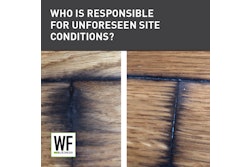
If you are a subcontractor, it is always best to sign a solid written agreement. I have reviewed and drafted many of these agreements, and in this multi-part series I will detail the top clauses a subcontractor should review—and potentially change—before agreeing to a subcontract.
1. Flow Down Requirements: The sub agrees to be bound by all terms of the agreement and any other documents between the GC and the GC’s customer (“Prime Contract”). Often subs agree to this without even reading the Prime Contract, but you should never agree to be bound by terms of an agreement you have never seen.
2. Scope of Work: Make sure the description of and specifications for the sub’s work is clear and accurate.
3. Subcontractor Review of Plans and Site Conditions: Subs are often required to acknowledge they have reviewed the plans and job site and that they can perform their work for the stated contract price. However, often the subs have not reviewed these prior to signing the subcontractor agreement.
4. Payment Terms: The agreements will usually also state when the sub must submit payment applications, how long the GC has to make payment, and the reasons that the GC may withhold payment. Here are things to beware of:
- Timing for payment: How much time does the GC have to pay you?
- Pay-If-Paid Clause: This clause means the sub will not be paid unless the owner pays the GC. Always ask to strike these clauses. If the GC will not agree, seek to add language stating your payment cannot be withheld due to negligence/failures on the part of the GC or other subcontractors working on the project.
- Retainage: How much will be held and when will it be released? Typically the amount is between 5% and 10%. Many subcontracts state that all subs must wait for the entire project to be completed before any retainage will be released. Seek earlier release of your own retainage based on completion of your own work, not the entire project.
5. Change Orders: The agreement will likely state that the GC will not be obligated to pay for any extra work unless the GC signs a written Change Order before the extra work begins. In reality, this rarely happens and a sub is asked to perform extra work on the fly on the job site with a Change Order to follow later. Ask to add language stating that any written confirmation (email, text) will suffice to approve extra work that the GC requests. Then request a confirmation email or text contemporaneous with when the extra work is verbally agreed upon.
In the August/September issue of WFB, I addressed more of the top clauses all subcontractors should review.

































